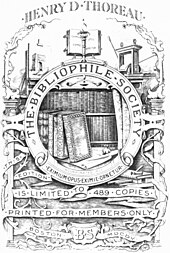Bibliophilia

Bibliophilia or bibliophilism is the love of books. A bibliophile or bookworm is an individual who loves and frequently reads or collects books.
Bibliophiles may have large, specialized book collections. They may highly value old editions, autographed copies, or illustrated versions. Bibliophilia is distinguishable from bibliomania, a compulsive obsession to collect books which can affect interpersonal relationships or health. The term "bibliophile" has been in use since 1820 and has been associated with historical figures like Lord Spencer and J.P. Morgan, who were known for their extensive book collections.
Profile
[edit]The classic bibliophile loves to read, admire and collect books,[A] often amassing a large and specialized collection. Bibliophiles usually possess books they love or that hold special value, as well as old editions with unusual bindings, autographed, or illustrated copies. [3] "Bibliophile" is an appropriate term for a minority of those who are book collectors.[4]
Usage of the term
[edit]Bibliophilia is not to be confused with bibliomania, a potential symptom of obsessive–compulsive disorder involving the collecting of books to the extent that interpersonal relations or health may be negatively affected, and in which the mere fact that a physical object is a book is sufficient for it to be collected or beloved. Some use the term "bibliomania" interchangeably with "bibliophily", and in fact, the Library of Congress does not use the term "bibliophily," but rather refers to its readers as either book collectors or bibliomaniacs.[5][verification needed]
History
[edit]According to Arthur H. Minters, the "private collecting of books was a fashion indulged in by many Romans, including Cicero and Atticus".[6] The term bibliophile entered the English language in 1820.[7] A bibliophile is to be distinguished from the much older notion of a bookman (which dates back to 1583), who is one who loves books, and especially reading; more generally, a bookman is one who participates in writing, publishing, or selling books.[8]
Lord Spencer and the Marquess of Blandford were noted bibliophiles. "The Roxburghe sale quickly became a foundational myth for the burgeoning secondhand book trade, and remains so to this day"; this sale is memorable due to the competition between "Lord Spencer and the marquis of Blandford [which] drove [the price of a probable first edition of Boccaccio's Decameron up to the astonishing and unprecedented sum of £2,260".[9] J. P. Morgan was also a noted bibliophile. In 1884, he paid $24,750 ($772,130.92, adjusted for inflation for 2021)[10] for a 1459 edition of the Mainz Psalter.[11] Many bibliophiles such as Jay I. Kislak, donate their collections to libraries.
In the 20th century, the American tradition of women book collectors begins with the Women's Bibliophile Club in New York City, Hroswitha Club.
See also
[edit]
- Book collecting
- Bibliophobia
- Oxford University Society of Bibliophiles, UK
- United States:
- Similar terms
- Audiophilia
- Cinephilia
- Comicphilia
- Infophilia
- Telephilia
- Videophilia
References
[edit]Notes
[edit]- ^ Of course, a bookworm is an insect that eats books. The term "bookworm" is often used as a metaphor to describe a voracious reader, an indiscriminate reader, or a bibliophile. In its earliest iterations, it had a negative connotation—that is, it denoted an idler who read rather than worked. Over the years its meaning has drifted in a more positive direction.[1] Another meaning of the word is "a person who pays more attention to formal rules and book learning than they merit."[2]
Citations
[edit]- ^ "Is 'bookworm' positive or negative?". Merriam Webster. Retrieved June 18, 2019.
- ^ "Bookworm". synonyms. Retrieved June 19, 2019.
- ^ Holzenberg, Eric. "The Bibliophile as Bibliographer". The papers of the Bibliographical Society of America. 104.4 (2010): 421–431.
- ^ Carter, John, Nicolas Barker and Simran Thadani. 2016. John Carter's ABC for Book Collectors, p.45. Ninth ed. New Castle Delaware: Oak Knoll Press.
- ^ "Home | Library of Congress". Library of Congress. Archived from the original on Dec 25, 2023.
- ^ Minters, Arthur H. (1979). Collecting Books for Fun and Profit. New York: Arco Publishing Inc. ISBN 0-668-04598-1.
- ^ "bibliophile". Merriam-Webster.com Dictionary. Merriam-Webster.
- ^ "bookman". Merriam-Webster.com Dictionary. Merriam-Webster.
- ^ Connell, Philip (2000). "Book Collecting: Cultural Politics, and the Rise of Literary Heritage in Romantic Britain". Representations. 71: 24–47. doi:10.1525/rep.2000.71.1.01p00764.
- ^ "The Inflation Calculator". westegg.com. Retrieved 2022-06-20.
- ^ Basbanes, Nicholas (1995). A Gentle Madness: Bibliophiles, Bibliomanes, and the Eternal Passion for Books. New York: Henry Holt.
- Merriam-Webster, Inc. (1996). Merriam-Webster's Collegiate Dictionary (10th ed.). Springfield, Mass: Merriam-Webster, Inc. ISBN 0-87779-709-9.
Further reading
[edit]| External videos | |
|---|---|
- Bulletin du Bibliophile (1834-) Bulletin du bibliophile (1834). Since 1963 published by the Association Internationale de Bibliophilie.
- Richard de Bury (1902). The Love of Books: "The Philobiblon" translated by E. C. Thomas. London: Alexander Moring
- Thomas Frognall Dibdin (1809). Bibliomania. New York, Henry G. Bohn.
- Harper, H. H. (1904) "Book-Lovers, Bibliomaniacs and Book Clubs" The Riverside Press, Cambridge
- Holzenberg, Eric. "The Bibliophile as Bibliographer". The papers of the Bibliographical Society of America. 104.4 (2010): 421–431.
- Andrew Lang (1881). The Library. London, Macmillan & Co.
- Purcell, M. (2019). The Role of Librarians in a Historical Age of Obsession. Literary Hub.
- Rugg, Julie (2006). A Book Addict's Treasury. London: Frances Lincoln ISBN 0-7112-2685-7
- Stebbins, Robert A. (2013). The Committed Reader: Reading for Utility, Pleasure, and Fulfillment in the Twenty-First Century. Lanham, MD: Scarecrow.
External links
[edit] Media related to Bibliophilia at Wikimedia Commons
Media related to Bibliophilia at Wikimedia Commons The dictionary definition of bibliophilia at Wiktionary
The dictionary definition of bibliophilia at Wiktionary- Forbes article on bibliomania, by Finn-Olaf Jones, December 12, 2005] (archived 14 September 2007)

